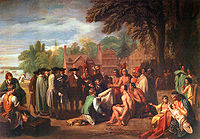- Curtis Act of 1898
-
The Curtis Act of 1898 was an amendment to the United States Dawes Act that brought about the allotment process of lands of the Five Civilized Tribes of Indian Territory: the Choctaw, Chickasaw, Muscogee, Cherokee, and Seminole. These tribes had been previously exempt from the 1887 General Allotment Act, also known as the Dawes Act (also known as the Dawes Severalty Act, named for its sponsor and author Senator Henry Laurens Dawes).[1] By effectively abolishing tribal courts and tribal governments in the Indian Territory of Oklahoma, the act enabled Oklahoma to attain statehood, which followed some years later.[2]
The Act, officially titled the "Act for the Protection of the People of Indian Territory", is named for Charles Curtis, its original author. He was of Kansa, Osage, Potawatomi, and French descent, was raised on the Kansas Reservation, and was a member of the United States House of Representatives.[3]
Although Charles Curtis was the author of the original draft of the Act, by the time the bill HR 8581 had gone through five revisions in committees in both the House of Representatives and the Senate; there was little of Curtis' original draft left to become law. In his own hand-written biography,[4] Curtis noted that he was unhappy with the final version of the Curtis Act. Curtis believed that the Five Civilized Tribes needed to make changes. He thought that the way ahead for Native Americans was through education and use of both their and the majority cultures, but he also had hoped to give more support to Native American transitions.
See also
- Dawes Act
- Dawes Commission
- Dawes Rolls
- Atoka Agreement
References
- ^ Wright, Muriel H. A Guide to the Indian Tribes of Oklahoma. Norman, OK: University of Oklahoma Press. 1968
- ^ Prucha, Francis Paul. Indian Policy in the United States, Lincoln, NB: University of Nebraska Press, 1981
- ^ Yoho, Carol. "Curtis Cemetery: Topeka, Kansas." Washburn University: Department of Art. 2003-2010 (26 Jan 2011)
- ^ Colvin manuscript Kansas State Historical Society
External links
- Charles Curtis; Native-American Indian Vice-President; a biography
- Encyclopedia of Oklahoma History and Culture - Curtis Act (1898)
Aboriginal title in the United States Statutes Colonial era: Charter of Freedoms and Exemptions (1629; New Netherland) Royal Proclamation of 1763 (British North America) · Confederation Congress Proclamation of 1783 · Northwest Ordinance (1787) · Nonintercourse Act (1790, 1793, 1796, 1799, 1802, and 1834) · Removal Act (1830) · Dawes Act (1887) · Curtis Act of 1898 · Reorganization Act (1934) · Indian Claims Commission Act (1946) · Indian Land Claims Settlements (1978—2006) · Indian Claims Limitations Act (1982)
Precedents Marshall Court: Johnson v. M'Intosh (1823); Cherokee Nation v. Georgia (1831) · Taney Court: Fellows v. Blacksmith (1857); New York ex rel. Cutler v. Dibble (1858) · Seneca Nation of Indians v. Christy (1896) · United States v. Santa Fe Pac. R.R. (1941) · Warren Court: Tee-Hit-Ton Indians v. United States (1955); Fed. Power Comm'n v. Tuscarora Indian Nation (1960) · Burger Court: Oneida Indian Nation of N.Y. State v. Oneida Cnty. (1974); Oneida Cnty. v. Oneida Indian Nation of N.Y. State (1985); South Carolina v. Catawba Indian Tribe (1986) · Rehnquist Court: Idaho v. Coeur d'Alene Tribe of Idaho (1997); Idaho v. United States (2001); City of Sherrill v. Oneida Indian Nation of N.Y. (2005)By state Alaska · California · Hawaii · Indiana · Louisiana · Maine · New Mexico · New York · Rhode Island · VermontCompare Categories:- United States federal Native American legislation
- Legal history of the United States
- Cherokee Nation (19th century)
- 1898 in law
- History of the United States (1865–1918)
- Pre-state history of Oklahoma
- Aboriginal title in the United States
- History stubs
Wikimedia Foundation. 2010.
